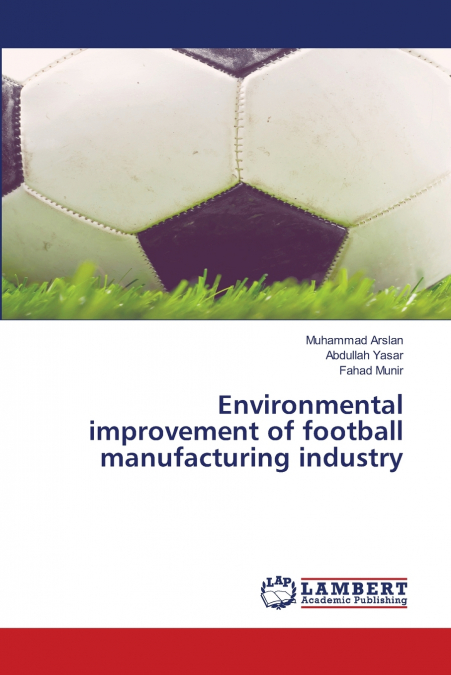
Abdullah Yasar / Fahad Munir / Muhammad Arslan
 Librería Perelló (Valencia)
Librería Perelló (Valencia)
 Librería Aciertas (Toledo)
Librería Aciertas (Toledo)
 Librería Elías (Asturias)
Librería Elías (Asturias)
 Donde los libros
Donde los libros
 El AlmaZen del Alquimista (Sevilla)
El AlmaZen del Alquimista (Sevilla)
 Librería Kolima (Madrid)
Librería Kolima (Madrid)
 Librería Proteo (Málaga)
Librería Proteo (Málaga)
Pakistan is the second-largest manufacturer of high-quality footballs worldwide. The current study was conducted to improve the environment of a large-scale football manufacturing industry located in Sialkot. The objectives of this study were to conduct an environmental baseline study of the industry considering noise, air, water, solid waste, and energy aspects, and to construct an environmental management plan of the industry for environmental improvement. Quantitative and qualitative surveys were used to collect data. Temperature, humidity, light intensity, noise, suspended particulate matter and gaseous emissions (CO, Ozone, SO2, NO2, NH3, H2S) were measured by using different instruments on-site. The results have shown that the relative humidity was high in the bladder dipping hall (77%) and material cutting hall (72%) as compared to OSHA standards (i.e. 20-60%). The suspended particulate matter in the powder coating area was very higher (14535 µg/m3) than NEQS/PEQS limits (i.e. 500 µg/m3). Ammonia (NH3) gas concentration was very high in the dipping hall (48.6 ppm), machine stitching hall (1.7 ppm), thermo-fitting hall (2.5 ppm), pasting hall (10.83 ppm), and bladder fitting